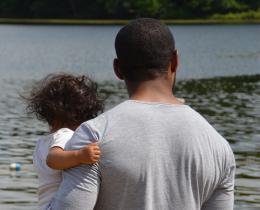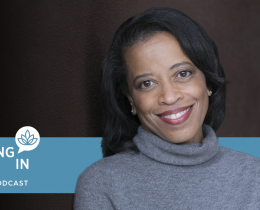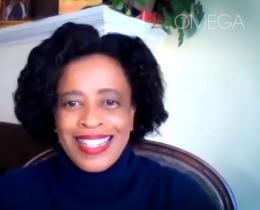Omega: You teach lawyers and law students mindfulness-based contemplative practices. What’s the difference between contemplation and thinking?
Rhonda: This question comes up often among my students, who are very used to thinking. One way I explain it is that contemplation invites an awareness of the experience of the mind, the body, and the embodied spirit while engaging in so-called thought. Contemplation is how our consciousness can perceive thought and not attach to it.
Thinking is a narrow cognitive experience and the thinking mind is often quite identified with the thoughts themselves and focused on them in a way that sometimes pushes out other dimensions of experience. It’s not that we don’t need thinking, but it can shut us off to other ways of knowing. Contemplation invites you to hold a question and enter into different ways of knowing that might arise as you reflect on the question.
Omega: One of your goals is to humanize education, especially legal education. What does this mean to you?
Rhonda: I teach at a traditional institution that has its roots in an old way of thinking about what it means to educate people. Traditional education sees the student as an isolated, atomized being in a world of separate beings who are looking to maximize their self-interest. Students are seen as being there to deposit information into. There’s some truth to that, but I think we oversubscribe to the idea.
Humanizing education is really about creating some space in traditional education for honoring the different, beautiful, and often underappreciated dimensions of what it means to be a human being. A humanizing approach doesn’t have a particular agenda—it is a much more open query about learning. We are challenging the notion that we are isolated, separate selves, and we're open to learning anything that will help us understand what it means to be human.
As an educator, it's really about coming into the classroom from a place of awe for all that we might be seeking to do when we have the privilege of working with the minds of our students. That includes working with the heart and creating a sense of connection between students. It also includes recognizing what it means to be a self that is not a hard, bounded entity, but, to use the language of Thich Nhat Hanh, to realize we “inter-are.”
Omega: Why is it important for us to learn to listen to each other?
Rhonda: For those of us who care about democratic institutions like education, law, and politics, we know that to make those systems work we inevitably have to engage with each other. The project of liberal democracy, or the experiment we call America, is about creating a broader and broader conversation that includes more and more of us around the core questions of our political conversation. To be able to do that to any degree, which is essential to this broader project of social justice—or just plain justice, we need to learn to listen.
I think of law in the language of Kellye Testy, the former dean of the University of Washington School of Law who speaks of law as the framework for human thriving. If we're going to have a system that is about thriving for all human beings, we've got to develop the capacity to listen to one another.
Omega: How do you teach your students to listen better?
Rhonda: Contemplative practices offer us concrete ways of doing that. First they make clear the importance of doing our own personal work. Daily formal and informal mindfulness practices help us become more present to our own thoughts and sensations. We can't get anywhere without recognizing what we each bring into these conversations, and that takes work because we all have blind spots.
Once we've made the commitment to our own work, we can practice interpersonal skills like mindful listening and mindful speaking, which are about bringing mindfulness—the nonjudgemental capacity to be aware and present, with a certain kind of receptivity and friendliness—to our conversations. I'm a huge advocate of mindful communication practices as well as nonviolent communication trainings and practices that help us see how to transform energy that can be destructive. For instance, when anger comes up when someone is voicing an opinion that we think is antithetical to something that we deeply value and believe, these practices can help us respond rather than react.
Omega: What if someone says something we strongly disagree with?
Rhonda: In conversations where we differ from others, there is often a profound sense of “us versus them.” Mindfulness and contemplative practices foster a sense of connectedness, and compassion inevitably flows from that. So if you have a contemplative practice and someone says something you disagree with, you can recognize we’re still all in this together. No one needs to be thrown out of the human community.
It's empowering to be able to not be emotionally hijacked when someone is saying something that we really don't like. It's important to be able to sit in the fire of that sense of reactivity and transform it into some kind of positive energy for continuing and deepening the conversation.
Omega: In addition to your classroom work, how else are you seeing mindfulness being used in the justice system?
Rhonda: In addition to my law students, I teach mindfulness to others in law, including public defenders, prosecutors, and public safety officers. I think this has tremendous potential in a time when we are reminded every day in the news that there are many ways that our criminal justice system can be a place for the arising of injustice and a lack of respect for each other, especially in the growing divide between police and communities.
Those of us doing this work in the criminal justice system are coming to understand how the system has been furthering the prior work of segregation. Michelle Alexander’s book The New Jim Crow explains this connection. Mindfulness practices are one way we can start to bring attention to this and make change.
I also teach mindfulness to community advocates and social justice workers in San Francisco. I'm particularly moved by how many of them are discovering what I call personal justice—the need to heal on an individual level if you’re going to try and make change in the world. This is a profound point of awareness. It may seem small, healing one person at a time through mindfulness, but it’s the most inspiring thing to me and something that I’m heartened by right now.
Omega: How do you stay energized and inspired to do this work?
Rhonda: I consider myself something of an introvert. I can play the extrovert very well, but I absolutely need to recharge with quiet time, and my contemplative practice supports that. It supports me so I can engage with others in a way that makes it less likely that I'm going to get depleted and more likely I’ll experience the joy this work brings me.
Teaching classes on mindfulness and compassion to predominantly lower-income community advocates of color in San Francisco is tremendously gratifying. When I turn on the news and there's a lot of anxiety about some new incident, if I can, at the same time, experience connection with other people around some practices of meaning and some sense of hope, it renews me every time.



